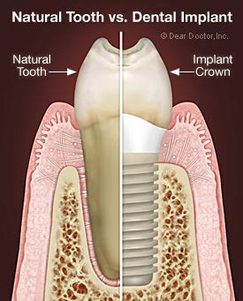 Dental illustration by Dear Doctor (deardoctor.com)
Dental illustration by Dear Doctor (deardoctor.com) Dental implants have been used for thousands of years to replace missing teeth. Archeologists have discovered ancient Mayan skulls as old as 600 A.D. with teeth replaced by carved stones (such as jade) to bits of seashells. Amazingly, some of these implants actually fused to the jawbone, which is essential to lasting success.
Over the past 25 years, dental implants have changed the face of dentistry. Current treatments offer a combination of science, research, and surgical skill.
How implants work
A dentist surgically positions the implant, or artificial root, in the jawbone. It becomes invisible once placed and acts as the anchor for a crown, bridgework or dentures. (See diagram.) Implants are used for single-tooth replacement, fixed multiple-tooth replacement, and removable implant-supported tooth replacement (dentures).
Titanium is often used for implants because it’s lightweight, strong and easily fuses to the bone. In addition to replacing lost teeth, dental implants stabilize the bone and helps maintain the jawbone’s shape and density. Dental implants also support the facial skeleton and soft tissue structures—gums, cheeks and lips. The face remains completely natural-looking when eating, chewing, talking, and smiling.
Are you a good candidate?
Generally speaking, if you have lost teeth, then you’re candidate for dental implants. You must be in good health without any medical conditions that may affect whether dental implants will fuse to your bone. In consulting your dentist, it is important to give your medical status (past and present) as well as all the medications, including prescriptions, alternative (herbal), or over-the-counter.
Before an implant, your dentist conducts a detailed assessment of your mouth and jaw, which includes models of your mouth and bite as well as x-rays and 3D scans. Experience in the use of computer imaging and dental surgery helps to ensure that the implants are placed in exactly the right position in the bone. A simple, uncomplicated dental implant placement usually takes less than an hour. Healing is quick, with only minor discomfort that can be managed with ibuprofen or similar medication. The implant generally requires two to six months to fuse to the jawbone before tooth restorations are attached.
Maintenance
Like natural teeth, implants do require daily brushing and flossing to control bacteria. Regular visits to your dentist are also necessary for cleaning and to make sure the implant is stable and crowns, bridgework or dentures are functioning satisfactorily.
Better With Than Without
Dental implants not only replace missing teeth—they protect the jawbone from bone loss and help support the facial skeleton, lips and cheeks. In addition to the obvious cosmetic advantages, your decision to investigate a dental implant will help preserve your oral health for years to come.
Over the past 25 years, dental implants have changed the face of dentistry. Current treatments offer a combination of science, research, and surgical skill.
How implants work
A dentist surgically positions the implant, or artificial root, in the jawbone. It becomes invisible once placed and acts as the anchor for a crown, bridgework or dentures. (See diagram.) Implants are used for single-tooth replacement, fixed multiple-tooth replacement, and removable implant-supported tooth replacement (dentures).
Titanium is often used for implants because it’s lightweight, strong and easily fuses to the bone. In addition to replacing lost teeth, dental implants stabilize the bone and helps maintain the jawbone’s shape and density. Dental implants also support the facial skeleton and soft tissue structures—gums, cheeks and lips. The face remains completely natural-looking when eating, chewing, talking, and smiling.
Are you a good candidate?
Generally speaking, if you have lost teeth, then you’re candidate for dental implants. You must be in good health without any medical conditions that may affect whether dental implants will fuse to your bone. In consulting your dentist, it is important to give your medical status (past and present) as well as all the medications, including prescriptions, alternative (herbal), or over-the-counter.
Before an implant, your dentist conducts a detailed assessment of your mouth and jaw, which includes models of your mouth and bite as well as x-rays and 3D scans. Experience in the use of computer imaging and dental surgery helps to ensure that the implants are placed in exactly the right position in the bone. A simple, uncomplicated dental implant placement usually takes less than an hour. Healing is quick, with only minor discomfort that can be managed with ibuprofen or similar medication. The implant generally requires two to six months to fuse to the jawbone before tooth restorations are attached.
Maintenance
Like natural teeth, implants do require daily brushing and flossing to control bacteria. Regular visits to your dentist are also necessary for cleaning and to make sure the implant is stable and crowns, bridgework or dentures are functioning satisfactorily.
Better With Than Without
Dental implants not only replace missing teeth—they protect the jawbone from bone loss and help support the facial skeleton, lips and cheeks. In addition to the obvious cosmetic advantages, your decision to investigate a dental implant will help preserve your oral health for years to come.

 RSS Feed
RSS Feed


